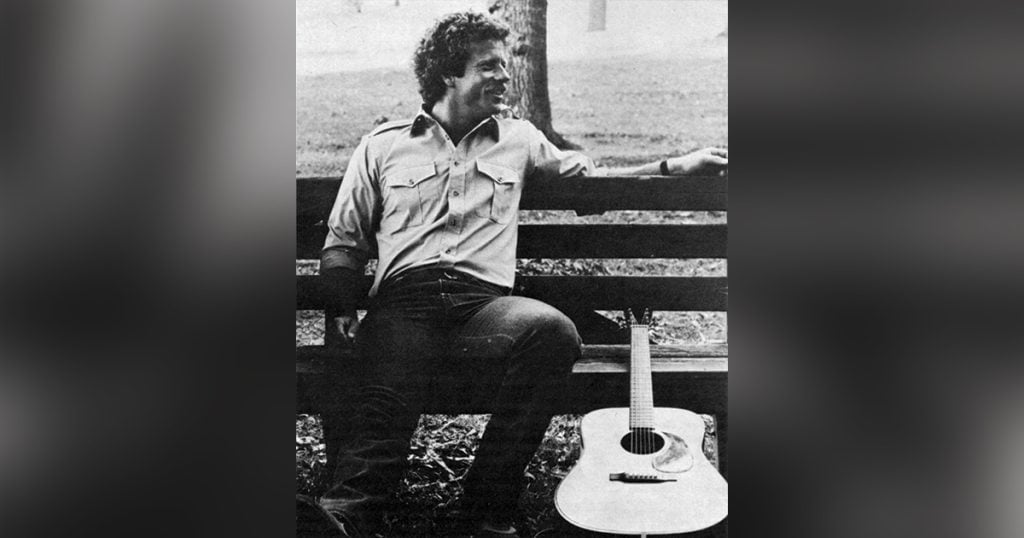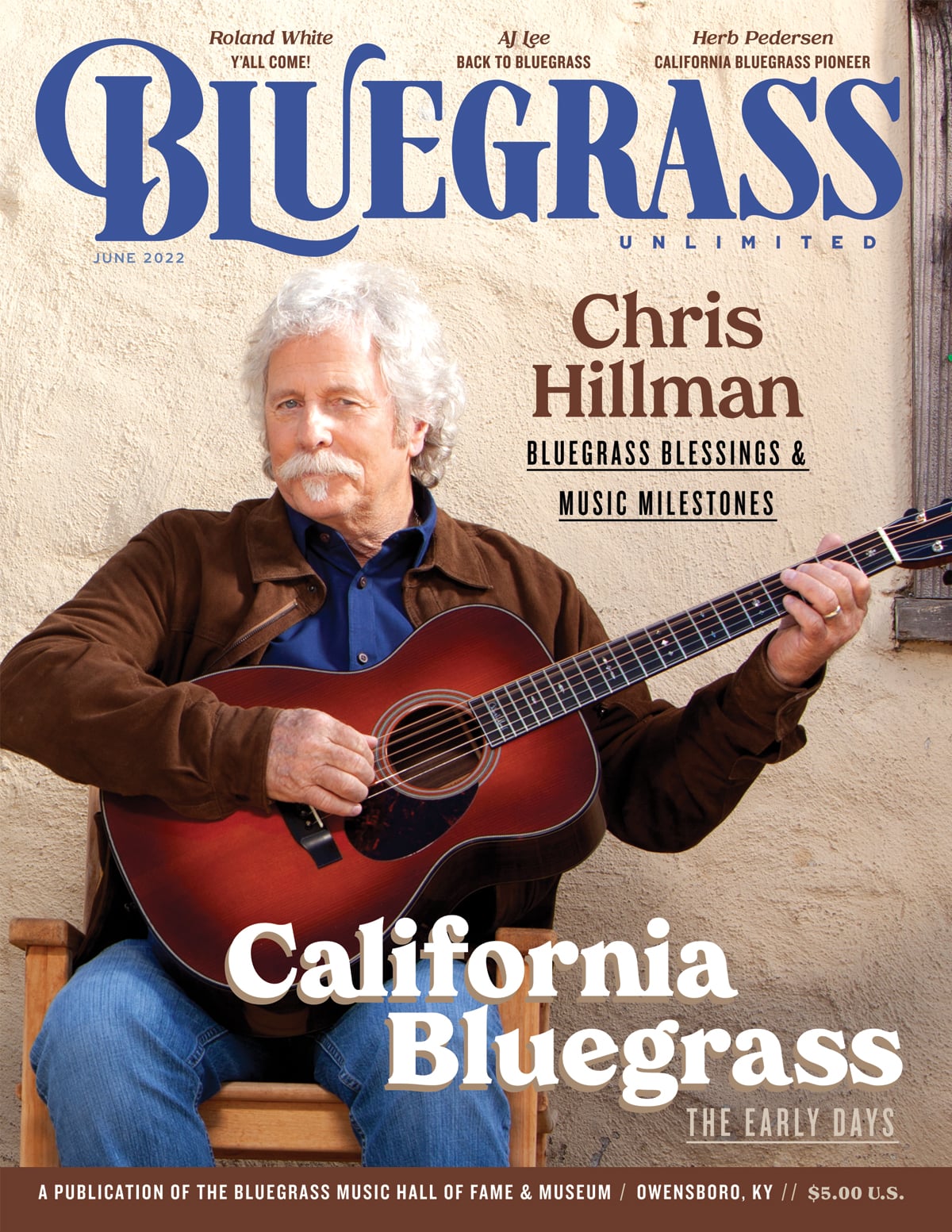Home > Articles > The Archives > Chris Hillman Returns to His Roots
Chris Hillman Returns to His Roots
Reprinted from Bluegrass Unlimited Magazine
February 1984, Volume 18, Number 8
Chris Hillman has made rock history, but he has given up the glitter of the pop music world to return to his musical roots in bluegrass. His lovely Sugar Hill LP, “Morning Sky,” is a clear demonstration of his commitment to acoustic-based country music. It is a minor masterpiece of a record, a polished jewel of sound.
It combines Hillman’s vocal and instrumental talents with those of ex-Eagle Bernie Leadon, ex-Country Gazette picker Kenny Wertz, Emory Gordy of Rodney Crowell and Rosanne Cash’s Cherry Bombs band, former Emmylou Harris sideman Herb Pedersen, steel guitar ace Al Perkins, and all-around bluegrass wonder Byron Berline. “Morning Sky” is by no means Hillman’s first brush with superstar sidemen, however. Indeed, he’s been picking with the best in bluegrass right from the start.
His background is rural, so his early bluegrass/country experience came naturally. Early Hillman record company biographies portrayed him as an authentic cowboy, a characterization he now admits was an exaggeration. Nevertheless, “We had a small ranch; and I did an awful lot of horseback ridin’ back then,” he says. “I rode in a lot of shows when I was a teenager.” There wasn’t much else to do; “I grew up in a town of just 800 people in Southern California,” he reports.
Following a classic pattern of rural youths, Chris took up the guitar and mandolin and drifted into the bluegrass scene. In the late-1950s Chris joined his first band, The Scottsville Squirrel Barkers, a bluegrass outfit that recorded a supermarket-sale album in five hours, for which they were paid $50 each, Chris recalls.
He then joined the pioneering California bluegrass group the Golden State Boys. Although together only a short time, this outfit was widely influential in the development of the West Coast bluegrass boom. Don Parmley and brothers Vern and Rex Gosdin were Hillman’s partners in the Golden State Boys.
Parmley was then pursuing music in fits and starts. He had begun his career playing banjo in 1956 with Hylo Brown in Kentucky, but had moved west shortly afterward. For the next 10 years he was a Trailways bus driver. Still, he always found time to make music. Besides the Golden State Boys stint, Parmley picked up some change playing the banjo breaks as the background music throughout the nine-year run of TV’s “Beverly Hillbillies” series. With his 13-year-old son David, Don founded the famed Bluegrass Cardinals in 1974. It was not until 1976, however, that he made a fulltime commitment to music and moved back east with the group.
The Gosdins were drifting in and out of professional music, too. Born on a farm in Alabama, Vern and Rex were two of nine gospel-singing children. As the Gosdin Family they appeared regularly on Birmingham’s WVOK radio in the early-1950s. They tried their luck in Atlanta and Chicago both as solo acts and as a duet before moving to California and the Golden State Boys. As the Gosdin Brothers, Vern and Rex broke through on the country charts with “Hangin’ On” in 1967. They maintained their bluegrass harmonies on their critically-acclaimed “Sounds of Goodbye” Capitol LP the following year before breaking up.
Vern resurfaced as a successful solo artist on the country charts in 1975-76; and he has enjoyed a steady string of top-ten records on Elektra, Ovation, AMI, and PolyGram/Compleat since. Rex wrote hits for country stars Jack Greene (“The Rock I’m Leaning On”), George Jones (“Someday My Day Will Come”), and Leon Everette (“Just Give Me What You Think Is Fair”). He also continued to record, sometimes with Waylon Jennings’ brother Tommy as his duet partner. He had just released a Sun Records single when he died of a heart attack May 23, 1983.
“Vern and Rex taught me about singing and harmony,” Chris reflects. “I thank my lucky stars that I got to work with them. Vern was like my big brother. We worked these horrible bars. I was underage and had a fake I.D.; and he and Don [Parmley] watched out for me.”
The quartet recorded as the Hillmen. “That record came out in 1963, exactly 20 years ago,” Chris muses. It has remained a classic, enjoying repeated reissues. In 1970 it came out on Together Records. But, “Together Records wasn’t too together,” Hillman laughs. “They were all pressed with the holes off-center and the albums sounded awful.”
Last year’s Sugar Hill reissue of “The Hillmen” restored the disc to its rightful place in bluegrass history. And its success led to Chris being on the label with “Morning Sky.”
There’s a lot of water under the proverbial bridge between those two Sugar Hill albums, however. Hillman made almost a two-decade detour from his bluegrass base.
As a bass player, he became a founding member of the Byrds. The premiere folk-rock group of the mid-1960s, the act also launched the country-rock movement with its 1968 “Sweetheart of the Rodeo” album. That record familiarized rock fans with such standards as the Louvin’s “The Christian Life,” Cindy Walker’s “Blue Canadian Rockies,” and the traditional “I Am a Pilgrim.”
Chris Hillman took this concept a step further by founding the Flying Bur- rito Brothers with Gram Parsons shortly afterward. This volatile collection of country-rockers solidified Chris’ reputation as the stable, dependable, calm journeyman picker who could generally be counted on to keep his wits about him when everyone else was losing theirs.
When the original Flying Burrito Brothers broke up, Chris found himself at the crossroads of country and rock. Had he attempted a solo career at this point, he would probably have drifted back to bluegrass earlier than he eventually did. Instead, he and steel guitarist Al Perkins joined Stephen Stills’ rock group Manassas. Hillman became second-in-command in that top-selling and top-touring aggregation from 1971 to 1973.
He left to form the Souther-Hillman-Furay band with master songwriter John David Souther and ex-Poco member Richie Furay. The trio enjoyed a top-20 pop hit with “Failin’ In Love” in 1974.
From 1976 to 1978 he made his first attempt at a solo career. He released two LPs on Asylum Records. “Asylum had its hands full with singer/songwriters, though. I was one of two dozen on the label,” Hillman recalls wryly. His efforts received scant attention.
He teamed up his old Byrds buddies Roger McGuinn and Gene Clark for a series of albums. “When we went out on tour, we found we’d gotten back the old magic of the Byrds…did three LPs for Capitol. Gene left. Roger and I stayed, but during a record company purge, we abandoned the act, too,” Chris recalls, without rancor.
Despite his years of experience as a rock sideman, Hillman had maintained a certain directness and simplicity. To put it succinctly, he has the personality of a country musician. “I never felt happy in those big rock bands,” he says. “You fall victim to a certain kind of pressure in those situations.” He has done a complete turnaround; and now performs with just Al Perkins—two musicians on a stage, instead of a stadium-sized bank of amplifiers.
And what Hillman and Perkins were playing on tour this past summer are the songs from an album as fresh and beautiful as a splash of cold mountain water, a bluegrass-flavored masterwork with heart and soul to spare. Hillman’s Asylum solo LPs were made up of his own compositions. “I still have several unrecorded songs; but when I went to record “Morning Sky” about a year ago, I wanted to make it a record of my favorite songs by others. My own songs can translate to country, but not well to bluegrass as these do,” he comments.
Bob Dylan’s “Tomorrow Is a Long Time” has a marvelous lilt as performed by Hillman. “The Taker,” a Kris Kristofferson/Shel Silverstein collaboration that was once a Waylon Jennings rocker, comes across like a hoedown. Jerry Garcia’s “Ripple” becomes a country ballad. Hillman reprises Gram Parsons’ classic “Hickory Wind” as a reminder of his Byrds/Burritos days. The bluegrass oldies “Here Today and Gone Tomorrow” and “Don’t Let Your Sweet Love Die” have all the emotion and authenticity you would wish. And John Prine’s “It’s Happening To You” is stunning in its eloquence.
Indeed, it’s amazing how Hillman has made the compositions of contemporary country/pop composers like Kristofferson, Prine, Dylan, Garcia, Parsons, John David Souther, Danny O’Keefe, and Dan Fogelberg sound like hillbilly oldies. A key factor in this is the harmony singing by Herb Pederson. “I want to keep doing those duet vocals with Herb. We’ve known each other since age 18 in California,” says Chris. They’ve traveled similar paths, although Pederson has stayed closer to his bluegrass roots than Hillman.
Although he has performed with country-rockers Linda Ronstadt, Kris Kristofferson, John Denver, Emmylou Harris, Johnny Rivers, and the Earl Scruggs Revue, Herb Pedersen has always maintained memberships in bluegrass-oriented groups. From 1964 to 1967 he was the banjo player for Starday Records’ Vern & Ray. He was a member of Lester Flatt’s band after that. From 1967 to 1971 he was in the Dillards; and this was during the group’s peak era. His subsequent fame as a Los Angeles session musician led to his two Epic Records solo LPs in 1976-77. Like Hillman, however, he chose to make his solo records a fusion of many styles, rather than sticking to his bluegrass/country roots.
“Morning Sky” is as much a return to the music of his past for Herb Pedersen as it is for Chris Hillman. Were he touring with Hillman, “going back to square one,” as Chris puts it, he’d doubtless agree that it is a marked change in lifestyle from the West Coast country-rock studio scene.
“Coming to this has been the biggest adjustment of my life,” admits Chris Hillman. “It’s a tremendous challenge to go up and play acoustic, and meet the audience with music one-to-one.”
“But I’m enjoying this more than anything I’ve ever done,” he continues. “Someone just liking my music and talking straight to me about it the way bluegrass fans do means more to me than any amount of rock & roll money in the world.”
Share this article
1 Comment
Leave a Comment Cancel Reply
This site uses Akismet to reduce spam. Learn how your comment data is processed.


Just picked up a sealed copy of this record today at the local record store. I paid $8! I’m really looking forward to listening to it.